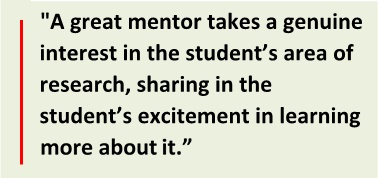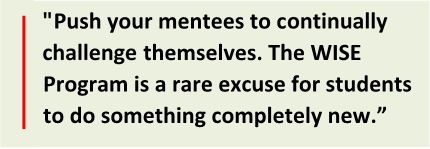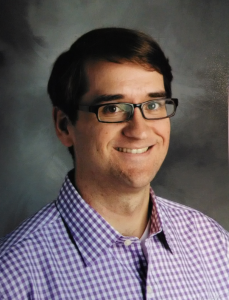Benjamin Kirk, a math teacher at Ithaca High School, has been a WISE mentor for five years. In a recent interview, Benjamin shares the highlights of his mentoring experience and explains why being a mentor is a little bit of a number of things: a cheerleader, a referee, an audience member, and an adviser.
Q: Share one of your most memorable moments as a mentor.
A: One of my proudest moments was when one of my mentees – who had learned sign language as her project – contacted me after she graduated to tell me about a sign language club she started to coincide with the nursing program she was enrolled in. The fact that her project is having such a long-lasting and significant impact on her future makes me feel extremely proud to have been a part of it.
Q: What is the most difficult part of being a mentor, and how did you overcome that challenge?
A: The most difficult part of being a mentor is when I don’t know anything about the topic my mentee is researching for their WISE project. I’ve had students research theater makeup, sign language, Hungarian cooking, and mathematics competition training. While I do know a thing or two about math, I know nothing about the other topics, so coming up with suggestions on sources for research was frequently a challenge. With the sign language project (mentioned above), I don’t know sign language and—I regret—did not have anywhere near the amount of time my student had to learn it, so I was unable to be a source for her to practice her skill.
I’ve learned that I don’t have to be knowledgeable about every topic to be an effective mentor. Having very little background on a topic my mentee is researching is often a blessing. Because students will be presenting their final project to an audience that has about as much background knowledge as I do, I can act as a practice “audience member” for my mentee. I can provide feedback to them as someone who knows much less about the subject matter than they do. I can tell them which parts of their project would be most interesting to a “layperson,” so they can improve their presentations. The mentoring experience has helped me be more confident in what I can positively contribute and not worry so much about what I’m unable to provide.
about as much background knowledge as I do, I can act as a practice “audience member” for my mentee. I can provide feedback to them as someone who knows much less about the subject matter than they do. I can tell them which parts of their project would be most interesting to a “layperson,” so they can improve their presentations. The mentoring experience has helped me be more confident in what I can positively contribute and not worry so much about what I’m unable to provide.
Q: What separates a good mentor from an extraordinary mentor?
A: A great mentor takes a genuine interest in the student’s area of research, sharing in the student’s excitement in learning more about it. If you want to be a great mentor, you can’t be afraid of the subject your mentee is exploring. You have to explore it with them. Ask them questions. Make your mentee explain things to you, even if—especially if—you feel uncomfortable for not understanding. The richest way to learn something is to teach it to someone else. Great mentors let their students teach them.
Q: What advice would you give to current/future WISE mentors—whether they are new to the program, or they have been a mentor for many years?
A: Push your mentees to  continually challenge themselves. The WISE Program is a rare excuse for students to do something completely different, to learn something completely new—like a skill they always wanted to learn, but never had the time to do. It is not meant to be a means for students to earn credit for something they’d be doing anyway, so push your students to go outside of their comfort zone for their project.
continually challenge themselves. The WISE Program is a rare excuse for students to do something completely different, to learn something completely new—like a skill they always wanted to learn, but never had the time to do. It is not meant to be a means for students to earn credit for something they’d be doing anyway, so push your students to go outside of their comfort zone for their project.


 Saving...
Saving...